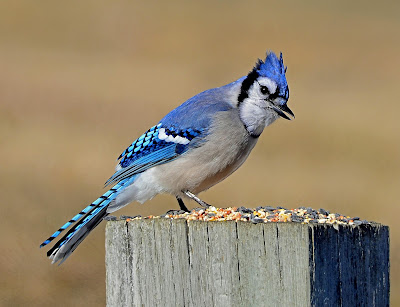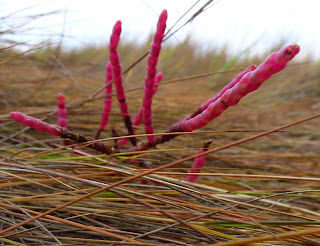Blue Mussels in Decline
by Sue Pike
October 15 2016 The York Weekly/York County Coast Star/Portsmouth Herald/Fosters Daily/Exeter News
My neighbor’s brother lives along the coast in Ipswich
Massachusetts. All of his life he has
gathered oysters, clams and mussels from the mudflats and rocky shoreline near
his house. He had noticed their
population declining over the past couple of years but as of this summer all of
his mussels were gone.
I like to mussel, it’s easy and I love those chewy orange
nuggets, especially steamed with garlic and
 |
| photo by Sue Pike Blue mussels at low tide |
This finding is huge, not only because it spells the end to
my carefree mussel-collecting days, but more importantly because of what it
means to the ecology of the coast, and by extension the health of all ocean and
terrestrial communities that rely upon the coast. Blue mussels are foundation species. Foundation species are organisms that have an
important role in structuring a community.
Corals and beaver are foundation species for obvious reasons. Mussels are foundation species because their
presence influences the diversity of intertidal habitats-when mussels are
abundant there are higher numbers of other intertidal species. If you think about it, having masses of
mussels attached to intertidal rocks creates a reef—a complex environment that
provides shelter for some species and novel attachment sites for others.
In addition to their role as foundation species mussels are
filter feeders-they clean the ocean around them-filtering out bacteria, heavy
metals and toxins (I have a friend who refuses to eat all filter feeders for
this reason).
Why are mussel populations in decline? It appears to be a combination of factors; warming
ocean temperatures (the Gulf of Maine is warming faster than almost any other
place on Earth!), increased harvesting by humans and predation by invasive
species. For example, since I moved back to Maine in the mid-1990s the invasive
Asian shore crab (Hemigrapsus sanguineus) has also moved in. These tiny crabs have a broad diet and are
wreaking havoc in the intertidal-they feed upon seaweeds, salt marsh grass,
larval and juvenile fish and many native invertebrates such as barnacles,
snails and bivalves (like mussels). One
study in Long Island Sound found that Asian shore crabs accounted for as much
as 25% of the blue mussel mortality at the site studied.
Human harvesting has also increased. Maine and Massachusetts account for the
majority of wild blue mussel harvesting on the east coast. These novel and highly efficient predators
(humans and crabs) coupled with warming ocean temperatures might be enough to
extirpate blue crabs from the Gulf of Maine.
Most studies of biodiversity decline indicate that we are in
the midst of the sixth mass extinction, an extinction event comparable to the
one that saw the end of the dinosaurs. This is the first mass extinction to be
caused by a single species (humans). I
find this hard to comprehend, I feel like if we’re in a mass extinction animals
and plants should be dropping dead all around us on a daily basis. I am usually
able to convince myself that it really isn’t that bad….and then I personally
experience something like the decline of the mussels and realize that it
is.



Comments
Post a Comment